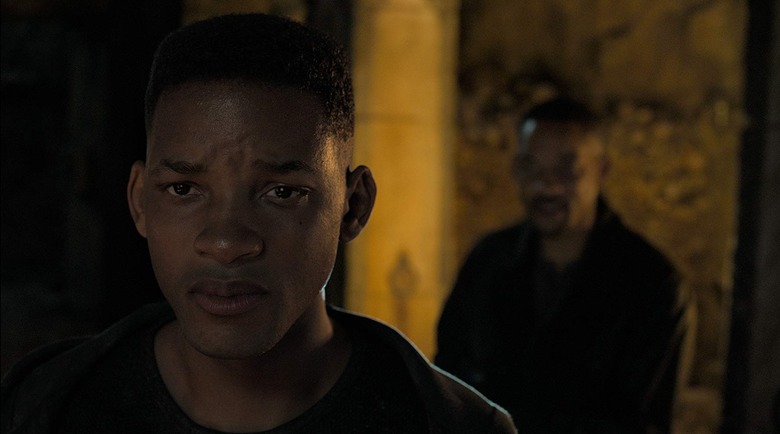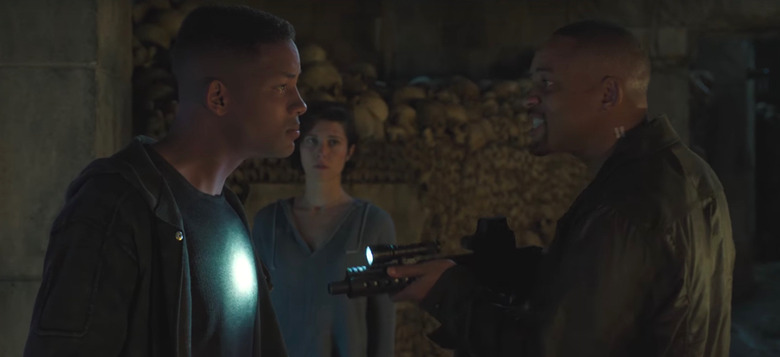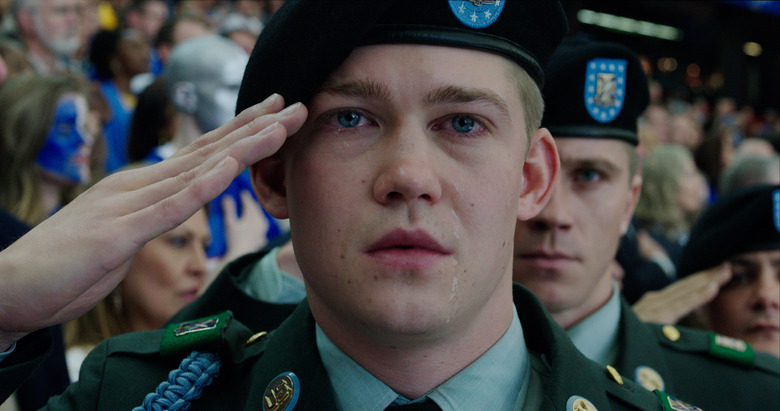Ang Lee On "Cloning" Will Smith And Learning From His Mistakes For 'Gemini Man' [Interview]
Gemini Man may be Ang Lee's most existential action movie. Starring Will Smith as a hitman who becomes the target of a younger clone of himself, Gemini Man is a fairly straightforward sci-fi action flick that has famously become the vessel for Lee's digital film innovations — shot digitally at an extra-high frame rate of 120 fps, modified for 3D, and featuring a fully CGI recreation of a younger Will Smith. But more than just presenting a new challenge for Lee, who has been experimenting with high frame rates since 2016's Billy Lynn's Long Halftime Walk, Gemini Man is an action movie that allows him to examine the endlessly fascinating "subject matter of nature versus nurture."
"The two Will Smith's coexisting, with one looking so much younger, in this medium the feeling is kind of existential," Lee told /Film at a roundtable interview for Gemini Man in New York. "It really makes you wonder about your own existence and what would you tell your younger self. And also see your trajectory when you're young."
You could say that Lee's recent career has been leading him straight to Gemini Man. The idea of digital creations caught his interest with 2012's Life of Pi, a survivalist drama in which a CGI tiger played a major role. And of course, there was his 2003 superhero blockbuster Hulk, which may have piqued his interest in experimenting with digital film technologies, but definitely was a precursor to Gemini Man's central conflict about duality and bad dads. "[It's] a little bit of unfinished business from that movie," Lee conceded. "This is something they try to hide, cover up who they really are. That's probably me, I don't know. I do have some father issues and my being a father myself. But that's just how I make movies."
That's still how Lee makes movies: from an emotional, character-driven perspective. As much as his films from the past decade have revolved around new technological innovations, Lee is still a character-first director. "To sell a story in a situation without a person really driving the performance...I don't think is believable," Lee said. "And I know it's not just about science."
For Lee, even with a digital effects-heavy film like Gemini Man, the science only makes up "10% of my work." The rest of the work is in making the effects invisible, by adding normal human error. "It looks like somebody shot it and messed it up," Lee said. "That takes the longest time [to do]." Especially in the case of 3D, which plays a prominent part of Gemini Man, Lee said.
People would be intimidated by 3D and more data and more details. But yes, it's more scary. Most people wouldn't try it. But you also have more material to work with — we had 40 times more data, which means we had 40 times more chances to flop or succeed. You just have more to work with. And when you're in 3D, it's sharper, your mindset is sharper. Both for the filmmaker and the viewer, you see it from a different place.
Why Will Smith is Not "De-Aged"
One of the things that Lee saw right away was that they couldn't use simple "de-aging" technology on his star. "You cannot put on makeup, erase wrinkles, and do a different hairstyle and act like a person is younger, or cast Will Smith's son to play him, and call that a clone," Lee said. "I think Junior being a CG character is a requirement. It's a whole package."
Junior, the younger clone of Will Smith's character Henry, is a completely CGI character, created through references to Smith's past films ("part of it is 6 Degrees of Separation, a lot of Bad Boys") as well as some motion-capture and stunt doubles. Smith would act out both roles. But it was more than simply putting dots on Smith's faces, Lee said.
"We did it from scratch. That's why I don't like to call it de-aging, I t's not just a brush-up. Age has more mysteries than just the wrinkles. When we started I was looking at him and thought, "Should he look older? Is he too young?" No. It's kind of sad what life does to you. Every layer of skin, every bone, it's just sad how much you age, even your enamel in your teeth, it's all the subtle changes. It's very inspiring, actually."
Smith had previously spoken about Lee's direction when he was performing Junior's lines versus Henry's lines. "Act less good," Smith recalled of Lee's advice. But Lee disagrees that this was Smith's whole approach to the vulnerable, naive Junior. "It's a lot more complicated than that, it's not just unlearn what you learned, it takes a lot more."
In the end, Junior is more than just an amalgamation of past Smith roles, or an older Smith trying to recreate his performance style of his younger days. "His own childhood and also his relation with his father, who was a military guy, it all comes to play," Lee said.
Making the Action Hit Harder
One of the three main reasons that Lee wanted to direct Gemini Man was to create Junior. The second one, and arguably the one that he most succeeds at, was to best utilize the digital technology to enhance action. The hits land harder, the punches crack louder in Gemini Man, and Lee effortlessly merges his experience with traditional Hong Kong fight choreography with the new potential of digital effects. "[I wanted to make the action] more visceral, more thinking [about] the realism of somebody exchanging punches when they're angry, the drama, the staging," Lee said. "It's more drama-oriented and more messy."
"I want to do a realistic fight, but choreographed. I've been trying to do that since I first shot Crouching Tiger and for 20 years I couldn't crack it. Movies being 100 some years old, nobody can crack it. It's really dancing, it's not fighting. When I flip you over, you let me make that flip because it's not because I flipped you over. The physics is the opposite of what a real fight is, with the strokes you'll never see intentions of that, so it was never realistic. But a realistic fight lasts two seconds You want more drama, you have to choreograph it, so it's really like a paradox.
His efforts come to a head in two major sequences in Gemini Man: a jaw-dropping motorcycle chase through the bright, vibrant streets of Cartagena, Colombia in which Will Smith throws a motorcycle at Will Smith; and a bone-crunching hand-to-hand fight scene between the two Will Smith's in an underground catacomb. The latter scene took nine months for Lee to film — "longer than I expected because once you want it to feel real, it's something else, it takes a course of it's own," Lee said.
Lee wants to continue experimenting with merging digital effects and 3D technology. "It changed the course of action," Lee gushed.
"Motorcycles, for example, motorcycles in a 2D movie is so strobe-y, the way to pump your energy is to do horizontal speed. So you have the speed and quick cuts. People get used to that. But now you see the performance. You don't see the strobes, it doesn't look that fast, what do you do? I think, what gets people excited? I think it's the detail: a change in a magazine, this that, the strategies, you get to see it. So I think that's a new kind of filmmaking and also this kind of a staging in and out of the perspective. First person, third person kind of exchange. It's a different kind of language and involvement for both filmmaker and the viewer.
"I want to do a next movie [with this technology]," Lee added. "Take the next step and see what could happen with this, when you change the physics of it."
Learning from His Mistakes
Gemini Man may be Lee's most existential movie, also because it's the fruit of Lee's own existential crisis, in a way, that followed the release of his first poorly received high-frame rate experiment, Billy Lynn's Long Halftime Walk. The 2016 war drama film, shot in the extra-high frame rate of 120 fps — the same that Gemini Man is shot in — was critically lambasted, with many calling its visual innovations a distraction. With the reception to that film, Lee said he's honing something he calls the "digital cinema aesthetic."
"Could I make it look good, light it differently, not just stripping away the artifice from the old age like Billy Lynn. A lot of people didn't respond to that very well. They get angry. So I tried to pick a genre movie with a movie star. But I light it, expose it, and art direction it in a different approach. I think that's...the beauty of digital, I suppose — I was just guessing, I was groping. So that's the dimension, clarity. But within that, how do you find what stimulates [that part of] our eyes that thinks it's good looking? And are you willing to devote yourself to a fictional world and enjoy that story? What is that state of mind that requires that it looks pretty?"
In pursuing that "aesthetic," Lee said that he made mistakes every day. It was almost a year into shooting Gemini Man that he found that he had achieved the digital effects he was striving for. Lee would tweak and perfect various elements — one of the most challenging, he would say, wasn't the big, epic action sequences, but the more traditional filmmaking techniques like a simple rack focus.
"We're really used in 2D to the rack [focus]. But you don't feel the depth. You feel the shift of clarity, you feel — somewhat — the filmmaker direct your attention from here to there. But that feeling, that's the 3D feeling. The depth feeling, it's also where your stage, the object you're identifying with which is him which is outside your space.
I think the relation with the frame, it's something quite tricky, quite interesting. Because I think with the frame, a psychologically you have your space and their space. When something's here you feel the pressure, the intensity, when it's turned around, you feel like you're yourself doing it — the way you identify with how you stage that object you were looking at, in which way is it something else?
Lee isn't done with this technology. He is planning to continue to experiment, to innovate with high frame rates and fully digital characters. But he knows that there's a point where he has to pull back — a completely CG film doesn't appeal to him or, he acknowledged, to audiences.
"Somewhere in the back of our head, we know it's CG, it's not real," Lee said. "I believe in a cocktail at least for now: you blend what's real and what's not."
***
Gemini Man hits theaters on October 11, 2019.



